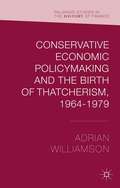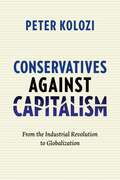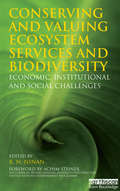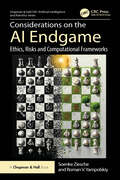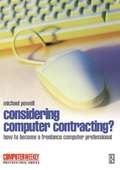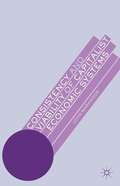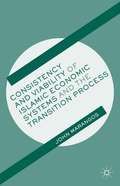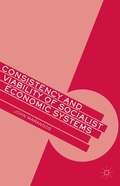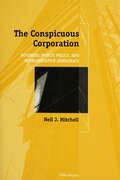- Table View
- List View
Conservative Economic Policymaking and the Birth of Thatcherism, 1964–1979
by Adrian WilliamsonIn this book, Adrian Williamson investigates the processes by which Thatcherism became established in Tory thinking, and questions to what extent the politician herself is responsible for Thatcherism within the Conservative Party.
Conservatives Against Capitalism: From the Industrial Revolution to Globalization
by Peter KoloziFew beliefs seem more fundamental to American conservatism than faith in the free market. Yet throughout American history, many of the major conservative intellectual and political figures have harbored deep misgivings about the unfettered market and its disruption of traditional values, hierarchies, and communities. In Conservatives Against Capitalism, Peter Kolozi traces the history of conservative skepticism about the influence of capitalism on politics, culture, and society.Kolozi discusses conservative critiques of capitalism—from its threat to the Southern way of life to its emasculating effects on American society to the dangers of free trade—considering the positions of a wide-ranging set of individuals, including John Calhoun, Theodore Roosevelt, Russell Kirk, Irving Kristol, and Patrick J. Buchanan. He examines the ways in which conservative thought went from outright opposition to capitalism to more muted critiques, ultimately reconciling itself to the workings and ethos of the market. By analyzing the unaddressed historical and present-day tensions between capitalism and conservative values, Kolozi shows that figures regarded as iconoclasts belong to a coherent tradition, and he creates a vital new understanding of the American conservative pantheon.
Conservatives Versus Wildcats: A Sociology of Financial Conflict
by Simone PolilloFor decades, the banking industry seemed to be a Swiss watch, quietly ticking along. But the recent financial crisis hints at the true nature of this sector. As Simone Polillo reveals inConservatives Versus Wildcats, conflict is a driving force. Conservative bankers strive to control money by allying themselves with political elites to restrict access to credit. Barriers to credit create social resistance, so rival bankers—wildcats—attempt to subvert the status quo by using money as a tool for breaking existing boundaries. For instance, wildcats may increase the circulation of existing currencies, incorporate new actors in financial markets, or produce altogether new financial instruments to create change. Using examples from the economic and social histories of 19th-century America and Italy, two decentralized polities where challenges to sound banking originated from above and below, this book reveals the collective tactics that conservative bankers devise to legitimize strict boundaries around credit—and the transgressive strategies that wildcat bankers employ in their challenge to this restrictive stance.
Conserving Plant Genetic Diversity in Protected Areas: Population Management of Crop Wild Relatives
by Nigel Maxted Mohammad Ehsan Dulloo José María IriondoRather than the usual focus on rare or endangered plants and ex situ efforts in conserving plant biodiversity, Iriondo (biodiversity and conservation, U. Rey Juan Carlos, Madrid, Spain) and the co-editors are devoted to the conservation of the genetic diversity of crop wild relatives in their natural environments. After presenting the increasingly urgent rationale for such conservation efforts, contributors to seven chapters address international/national initiatives including integrating efforts to maintain plant diversity with protected area management, issues in reserve location and design, monitoring technologies, and habitat recovery techniques. The volume includes highlighted case studies, and color plates of plants, interaction with local peoples for successful wild relative crop conservation, monitoring activities, a gene bank, and native plant nursery. Annotation ©2008 Book News, Inc., Portland, OR (booknews.com)
Conserving and Valuing Ecosystem Services and Biodiversity: Economic, Institutional and Social Challenges
by K. N. NinanThis book comprehensively addresses the economic, social and institutional difficulties in conserving biodiversity and the ecosystem services that it provides. It covers a wide range of issues such as biodiversity, ecosystem services and valuation in the context of diverse ecosystems such as tropical forests, marine areas, wetlands and agricultural landscapes, non-timber forest products, incentives and institutions, payments for ecosystem services, governance, intellectual property rights and the protection of traditional knowledge, management of protected areas, and climate change and biodiversity. It also covers the application of environmental economics and institutional economics to different cases and the use of techniques such as contingent valuation method and game theory. The book spans the globe with case studies drawn from a cross section of regions and continents including the UK, US, Europe, Australia, India, Africa and South America.
Consider Your Calling: Six Questions for Discerning Your Vocation
by Gordon T. SmithCourage and Calling
Consider a Spherical Patent: IP and Patenting in Technology Business
by Joseph E. GortychGet Critical Insight into the Modern Patenting Scene We are now living in the "IP Era of the Information Age" where technology businesses are placing increasing emphasis on intellectual property (IP) as a way to add to their bottom lines. As a consequence, those working in a technology business or organization will inevitably be thrust into working
Considerations for Integrating Women into Closed Occupations in U.S. Special Operations Forces
by Eric V. Larson Agnes Gereben Schaefer Derek Eaton J. Michael Polich Thomas S. Szayna Sean Robson Lynsay Ayer Zev Winkelman Miriam Matthews William Marcellino Angela O'Mahony Cameron Wright James Syme Lisa Kraus Marek N. PosardIntegrating women into special operations forces poses potential challenges for unit cohesion. The integration of women raises issues of effectiveness, in terms of physical standards and ensuring the readiness, cohesion, and morale essential to high-performing teams. This report assesses those challenges and provides analytical support for validating occupational standards for positions controlled by U.S. Special Operations Command.
Considerations for a Post-COVID-19 Technology and Innovation Ecosystem in China (Disaster Risk Reduction)
by Rajib Shaw Jinling Hua Bismark Adu GyamfiCOVID-19 has made differential impacts on countries and communities around the world. China, where COVID-19 started, has developed and utilized different types of technologies, including both traditional and disruptive technologies, to address the pandemic risks. Also, there have been many innovations in applying technologies in different contexts during the pandemic as well as in the post-pandemic recovery and preparedness aspects. This book covers some of these technological developments as well as the governance mechanisms for developing a technology and innovation ecosystem in a post-COVID-19 context in China. The book also explores the experiences and lessons learned from different types of technologies and their implementation in the post-COVID-19 period and highlights how they can be useful to prepare for future calamities.
Considerations in Applying Benefit-Cost Analysis to Preventive Interventions for Children, Youth, and Families
by Steve OlsonBenefit-cost analyses hold great promise for influencing policies related to children, youth, and families. By comparing the costs of preventive interventions with the long-term benefits of those interventions, benefit-cost analysis provides a tool for determining what kinds of investments have the greatest potential to reduce the physical, mental, and behavioral health problems of young people. More generally, the growth of benefit-cost analysis as a field of research and practice represents an exciting and promising trend in the development and implementation of public policies. The utility of benefit-cost analyses has been limited by a lack of uniformity in the methods and assumptions underlying these studies. For years, those who perform and those who use benefit-cost analyses have argued that the development and use of theoretical, technical, and reporting standards for benefit-cost analyses would enhance the validity of results, increase comparability across studies, and accelerate the progress of the field. Considerations in Applying Benefit-Cost Analysis to Preventive Interventions for Children, Youth, and Families is the summary of a workshop convened by the Board on Children, Youth, and Families of the Institute of Medicine and the National Research Council in November 2013 as the first phase of a possible two-part effort directed toward guiding future benefit-cost studies and enhancing the relevance of benefit-cost analysis to governments and other organizations wanting to make sound prevention decisions. The workshop brought together leading practitioners in the field, researchers who study the methodological and analytic dimensions of benefit-cost analysis, and representatives of organizations that use the results of benefit-cost analyses to shape and implement public policies. This report discusses a wide range of issues about benefit-cost analysis, including the level of research rigor that should be met before results from an evaluation are used to estimate or predict outcomes in a cost-benefit analysis; best practices and methodologies for costing prevention interventions; prevention outcomes that currently lend themselves to monetization; processes and methodologies that should be used when linking prevention outcomes to avoided costs or increased revenues; and best methods for handling risk and uncertainty in estimates.
Considerations on the AI Endgame: Ethics, Risks and Computational Frameworks (Chapman & Hall/CRC Artificial Intelligence and Robotics Series)
by Soenke Ziesche Roman V. YampolskiyThis seminal volume offers an interdisciplinary exploration into the rapidly evolving field of artificial intelligence and its societal implications. Written by leading scholars Soenke Ziesche and Roman V. Yampolskiy, the book delves into a multitude of topics that address the rapid technological advancements in AI and the ethical dilemmas that arise as a result.The topics explored range from an in-depth look at AI welfare science and policy frameworks to the mathematical underpinnings of machine intelligence. These subjects include discussions on preserving our personal identity in technological contexts as well as on the question of AI identity, innovative proposals towards the critical AI value alignment problem and a call to merge Western and non-Western approaches towards universal AI ethics. The work also introduces unconventional yet crucial angles, such as the concept of "ikigai" in AI ethics and a pioneering attempt to map a potential AI-driven ikigai universe as well as the role of design formalisation, or "Designometry," in the creation of artefacts.By offering a balanced mix of theoretical and applied insights, the book serves as an invaluable resource for researchers, policymakers and anyone interested in the future of AI and the extent of its impact on society.
Considerations on the Fundamental Principles of Pure Political Economy (Routledge Studies in the History of Economics)
by Vilfredo ParetoBetween May 1892 and October 1893 the Giornale degli Economisti published Vilfredo Pareto’s Considerazioni sui principi fondamentali dell’economia politica pura in five parts. Viewed in its entirety, the outcome is essentially a classic monograph on the fundamental issues in pure economic theory in the Lausanne tradition. Pareto's work forms a document of major historical significance which, to date, has only been available to the relatively small number of international economists and historians of economics who read Italian. This first English language edition is a significant landmark in the history of economics.
Considering Computer Contracting?: The Computer Weekly Guide To Becoming A Freelance Computer Professional (Computer Weekly Professional Ser.)
by Michael PowellConsidering computer contracting?If you are, then read this book. It explores the many aspects of the computer contracting world and gives sound practical advice to both the newcomer and the experienced contractor. It will also be invaluable if you are an employer wrestling with the perennial problem of finding staff in this highly competitive marketplace.Let this book show you how to break loose from being an employee to working freelance. The author, a freelancer himself, considers what it takes to become a contract worker and gives you invaluable information throughout to help you get started in the world of computer contracting. This book looks at:* why contract workers are used at all - what kind of companies actually employ contractors, and why?* how you make the transition from full-time working - what does it actually take temperamentally to be a successful contractor?* how you start - what does forming your own company involve, and why is it even necessary?* how you go about finding a contract, and negotiating the right rate.* what agencies do for you - and how can you find who are the best?* the financial differences between being a full-time employee and a contractor - how do you manage your affairs?* how you keep your experience up to date when you do not have a regular employer to help train you.* what sort of opportunities are available, and what sort of rates of pay you can expect.* your possible career progressions after contracting.The contracting scene is ever changing. In this wide-ranging book, the current outlook for contract staff is analysed as well as the trends in the computer industry which are driving these changes. Some doors are opening whilst other close - let this book be your guide.If you have marketable skills, the right attitude and would like to be your own boss, there could not be a better time to consider computer contracting.
Consiga el trabajo que en verdad necesita
by James CaanCon una situación del mercado de trabajo tan difícil, más que nunca es necesario detectar las oportunidades realmente interesantes, destacar por encima de los demás, y contar con la mejor estrategia para conseguir su objetivo. Consiga el trabajo que en verdad desea le muestra, paso a paso, cómo mantener una actitud positiva frente a las dificultades, destacar para conseguir una entrevista y, una vez ahí, desplegar toda su capacidad y pasión, hasta conquistar ese puesto que siempre ha deseado.«Magníficos consejos de principio a fin. Lo recomendamos a todos nuestros candidatos.»Keith Potts, director ejecutivo, Jobsite
Consiga un trabajo hoy (How to Write a Resume and Get a Job)
by Luis CortesConsiga Un Trabajo Hoy Encontrar un empleo puede ser una tarea estresante. Hasta resulta difícil saber por dónde comenzar. ¿Dónde están las listas de empleos? ¿Qué destrezas se requieren? ¿Cómo puede hacer que su hoja de vida se destaque? La búsqueda de un empleo conlleva muchas reglas que usted no puede quebrantar, y es fácil que inadvertidamente usted reduzca sus oportunidades. En Consiga un trabajo hoy, el Rdo. Luis Cortés le brinda a usted la información necesaria para obtener un empleo prometedor. Este libro lo conduce paso a paso a través de todo el proceso, desde la búsqueda y la solicitud de empleo, hasta la negociación de un mejor salario y la petición de beneficios. Un empleo no lo es todo en la vida, pero sí la llave de un futuro mejor. Este libro le garantiza que su búsqueda será exitosa.
Consigli per il business autonomo da casa (Come fare... #27)
by Owen JonesConsigli per il business autonomo da casa Molte persone sono tentate di provare a provare l'attività del marketing di affiliazione, perché commettono l'errore di credere a un mito quale realtà. Prima di tutto, forse, è che credono che gestire un'azienda su Internet sia facile e, in secondo luogo, è che pensano che si possano fare molti soldi con il marketing su Internet nel giro di una sola notte. Forse nemmeno lo 0,1% di coloro che si occupano di marketing affiliato diventano ricchi velocemente. Ci possono essere alcune persone che hanno raggiunto un grande successo in un breve periodo di tempo dopo la creazione di un sito web del programma di affiliazione, ma nessuno di loro dirà sinceramente che è stata solo fortuna. Chiunque stia facendo bene in questo tipo di business vi dirà che ha lavorato molto duramente per arrivare dove si trova ora. Il successo nel marketing di affiliazione richiede tempo e duro lavoro, ma ne vale la pena. Se state pianificando di iniziare un programma di affiliazione, una delle cose a cui dovete pensare è creare il vostro sito web e non un sito web ordinario, ma un sito dall'aspetto professionale. Come si crea un sito web di marketing di affiliazione? Quali sono i passi per crearne uno? Beh, per prima cosa dovete aver già deciso il tema o la nicchia del vostro sito web. Sarebbe meglio se aveste già un'idea di quali prodotti o servizi vorreste commercializzare, visto che questo vi aiuterà a tracciare il design e il layout delle vostre pagine web. La prossima cosa da fare è decidere il nome di un dominio e gestirlo in hosting. Il nome di dominio è il nome esclusivo utilizzato per etichettare l'URL del vostro sito web su Internet. Quando decidete quale nome di dominio registrare, esaminate il tipo di merce che state commercializzando e il relativo contenuto del vostro sito.
Consigli utili per risparmiare quotidianamente
by Jaime Villata C. Luca CatalanoSiamo una minaccia!… Quando maneggiamo il denaro… e questa è la triste realtà, per quante scuse possiamo cercare pur di negarlo. Questo modo di fare è palese quando desideriamo risparmiare, ma ci nascondiamo dietro la scusa che non abbiamo sufficienti entrate per farlo, per questo, se vogliamo migliorare la nostra capacità nel risparmiare dovremmo evitare di andare così spesso al bancomat, adesso ti diremo perché. Se il nostro obbiettivo è risparmiare, dobbiamo fare in modo di lasciare i nostri soldi sul conto bancario il più possibile, perché è importante farlo? La risposta è semplice, ti permette di avere le spese sotto controllo, con più ordine ed organizzazione. Le statistiche indicano che ritiriamo al bancomat più di una volta a settimana, sicuramente, una frequenza che è diminuita rispetto agli anni precedenti. In questo libro ti offro alcuni suggerimenti che a me sono risultati utili.
Consistency and Viability of Capitalist Economic Systems
by John MarangosConsistency and Viability of Capitalist Economic Systems develops an original analytical framework to understand the relationship between the economic, political, and ideological structures, the external environment, and the process of reform that give rise to certain economic systems by establishing consistency.
Consistency and Viability of Islamic Economic Systems and the Transition Process
by John MarangosConsistency and Viability of Islamic Economics Systems and the Transition Process has the crucial intention of stimulating interest in Islamic economics by studying the Islamic Republic of Iran using the analytical framework of consistency and viability. This text develops an original analytic framework to understand the relationship between the economic, political, and ideological structures, the external environment, and the process of reform that gives rise to certain economic systems by establishing consistency. Consistency, however, is not enough; a consistent economic system must be flexible and have the internal mechanisms to be able to adapt to changes in social reality, thus making possible its survival over time. In other words, the economic system is viable when it is able to encourage increases in labor productivity and there is popular support. The collapse of centrally administered socialism in Central and Eastern Europe and the former Soviet Union resulted in what was commonly referred to as the transition problem.
Consistency and Viability of Socialist Economic Systems
by John MarangosIn 1985, General Secretary Mikhail S. Gorbachev led the Soviet Union through a series of revolutionary reforms, such as Perestroika ('Restructuring') and Glasnost ('Openness'). Yet many of these changes failed, resulting in the collapse of centrally administered socialism throughout the country and most of Eastern Europe. Consistency and Viability of Socialist Economics Systems establishes a new and enlightening approach to understanding complex socialist economies. This book presents an original analytical framework to better map out the relationship between the economic, political, ideological structures, and the external environment, as well as the reform process that gives rise to certain economic systems.
Console Wars: Sega, Nintendo, and the Battle that Defined a Generation
by Blake J. HarrisNow a documentary on CBS All Access. Following the success of The Accidental Billionaires and Moneyball comes Console Wars—a mesmerizing, behind-the-scenes business thriller that chronicles how Sega, a small, scrappy gaming company led by an unlikely visionary and a team of rebels, took on the juggernaut Nintendo and revolutionized the video game industry. In 1990, Nintendo had a virtual monopoly on the video game industry. Sega, on the other hand, was just a faltering arcade company with big aspirations and even bigger personalities. But that would all change with the arrival of Tom Kalinske, a man who knew nothing about videogames and everything about fighting uphill battles. His unconventional tactics, combined with the blood, sweat and bold ideas of his renegade employees, transformed Sega and eventually led to a ruthless David-and-Goliath showdown with rival Nintendo.The battle was vicious, relentless, and highly profitable, eventually sparking a global corporate war that would be fought on several fronts: from living rooms and schoolyards to boardrooms and Congress. It was a once-in-a-lifetime, no-holds-barred conflict that pitted brother against brother, kid against adult, Sonic against Mario, and the US against Japan.Based on over two hundred interviews with former Sega and Nintendo employees, Console Wars is the underdog tale of how Kalinske miraculously turned an industry punchline into a market leader. It’s the story of how a humble family man, with an extraordinary imagination and a gift for turning problems into competitive advantages, inspired a team of underdogs to slay a giant and, as a result, birth a $60 billion dollar industry.A best book of the year: NPR, Slate, Publishers Weekly, Goodreads
Consolidated Aircraft Corporation (Images of America)
by San Diego Air and Space Museum Katrina Pescador Mark AldrichFounded by Reuben H. Fleet in 1923, Consolidated Aircraft Corporation (later Convair) became one of the most significant aircraft manufacturers in American history. For roughly 60 years, this prolific company was synonymous with San Diego. In fact, whole sections of the city were designed to provide homes for the Convair workers and their families. These men and women were responsible for building some of the most significant aircraft in aviation history, including the PBY Catalina, B-24 Liberator, F-102 Delta Dagger, as well as the reliable Atlas missile, which was vital in launching America into space. To this day, more than a decade after the company passed from the San Diego scene, tens of thousands of San Diegans still celebrate a seminal connection with Reuben Fleet, his company, and his popular slogan, "Nothing short of right is right."
Consolidating Gains and Producing More Change: Overcoming Barriers to Organizational Change
by John P. KotterMajor change often takes a long time, especially in big organizations. Short term wins are essential to keep the change effort going, but the celebration of those wins can be lethal if urgency is lost. If you let up before the job is done, critical momentum can be lost and regression may follow. This chapter was originally published as Chapter 9 of "Leading Change."
Conspicuous Consumption (Penguin Great Ideas)
by Thorstein VeblenWith its wry portrayal of a shallow, materialistic 'leisure class' obsessed by clothes, cars, consumer goods and climbing the social ladder, this withering satire on modern capitalism is as pertinent today as when it was written over a century ago.
Conspicuous Corporation: Business, Public Policy, and Representative Democracy
by Neil J. MitchellWhy, despite the political advantages of business in the policy process, do business interests still sometimes lose policy fights in the political system? Money, mobility, connections, and incentives load the political system in favor of business interests. Against the odds, when the conspicuous corporation meets the virtuous politician, business often loses in the policy struggle. In answering this question, Neil J. Mitchell reassesses the dimensions of business power in the political system and provides a fresh consideration of how economic power translates into political power. Charles Lindbloom's analysis of business power provides a point of departure for an examination of the evidence on business influence over public preferences, on the importance of business confidence to politicians, and on the financial and lobbying activities of business interests. Mitchell then considers the position of labor unions--the traditional opposition to business--in contemporary policy making. Finally, he discusses the conditions under which business power breaks down. This is accompanied by an analysis of a variety of cases in which business has attempted to influence the policy making process to test his findings. Extensively researched, this book sheds new light on the activities of business in politics, on the strength of interests opposing business, and on business policy failures in the United States and the United Kingdom. The empirical analysis builds on survey data, extensive interviews, and archival research. The relationship between business and government is a core topic for economists, sociologists and political scientists, taking us from heroic struggles over policy to sordid episodes of political corruption. The book will be of interest to scholars in the social sciences and in business schools as well as to the general reader interested in power and influence in representative democracies. Neil Mitchell is Professor of Political Science, University of New Mexico.
